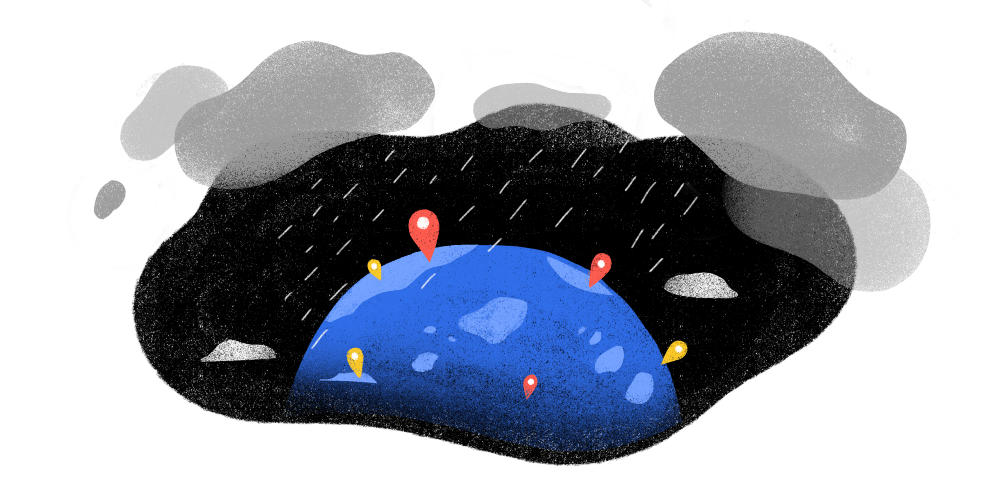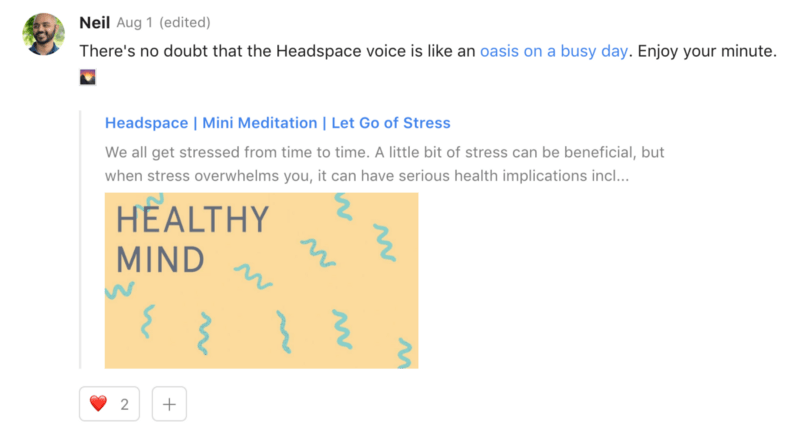
Articles about distance work often paint a picture with cocktails on the beach, traveling around the world and other pleasures, causing envy on social networks. This article is not like that.
Who is everywhere - that is nowhere. Those who spend their lives on wanderings, as a result, there are many hospitable people, but no friends.
Seneca.
At 23, I broke up with a girl, sold or handed out almost all my things, packed my suitcase and booked a one-way ticket to Taiwan. I lived the dream of travel and absolute freedom, having no idea that the most miserable period of my life was beginning.
For the protocol, ending long-term relationships and leaving family, friends, and any other significant human connections in the world is a terrible idea. Add a lack of balance between work and life - and get a ready-made recipe for depression.
Who is everywhere - nowhere
Freelance travelers rarely write about loneliness. You will not see this in Instagram stories, but I guarantee you that they have experienced it. If you travel for a long time, you lose your social circle, a sense of belonging and everyday routines that keep you on the ground and maintain peace of mind.
You will also quickly realize that meeting new people is easy, and making new friends - real friends - is difficult, especially from scratch.
I lived in Taiwan for about a year before returning to Europe. Having drunk a cocktail of depression, anxiety, insomnia and loneliness, I learned some hard lessons. And only after a few years he was able to fully recover.
Some love this lifestyle: work and travel. But there are not as many of them as it might seem from social networks. As people, we need true friends, loved ones, and a native place. Extensive research shows that people with strong social ties live longer, healthier , happier lives. Do not believe Airbnb, you can not suddenly become a "citizen of the world." Connections accumulate over time, there is no quick way.
Our Doist company mainly consists of remote employees. This means that people can work from anywhere in the world as long as they have an Internet connection. However, more than 95% of us usually live at home. Most prefer to take root in small towns, surrounded by friends and family. Remote work allows you to optimize your location for your benefit.
Remote workers do not have to travel to lead an interesting, fulfilling life. It is normal if friendship, social connections and mental health are more important than travel. It may not look so glamorous on Instagram, but in the end you are much happier.
Work traps from home
An obvious alternative to traveling remotely is working from home. But this is a certain isolation.
I have never sat in a real office or at a “real” job. I founded my first company remotely, and it was always difficult for me to separate life from work. Initially at the university, I worked from a dorm room. 15 students lived in one corridor, so there could be no default of communication. I did my homework or side projects, and when I left the room I played Sensible Soccer on the old Amiga, drank beer with a hostel neighbor or joined the team, no matter what they did.
At some point, I started making enough money to afford my own apartment. As an introvert programmer who appreciates silence and concentration, I thought that living alone would be the best option. Pretty quickly I realized that I was very wrong.
Living alone is hard, especially when you are young. Most of the time I just worked. Although I knew that it was necessary to set boundaries, I simply could not do this - there was always something to work on. It took effort to go out and see friends, but why? The result was a terrible habit of sitting at home.
Over the course of several months, constant work and social isolation gradually took hold of me. My “bad days” began, when a feeling of depression and anxiety swept over me. There were more and more bad days, and then there were more than good ones. Sometimes I went to bed at three in the night, and sometimes I slept until 2 p.m. Productivity decreased, which only increased anxiety and depression. The mood was completely unstable. I tried to create a routine and build the boundaries between life and work - to get up at the same time, stop work at a particular hour, take more breaks during the day - but none of the options worked for too long.
In the end, I realized that for the sake of mental health I had to make radical changes, so I rented an office near the university. Yes, I still worked alone, but in a different place. And yes, it turned out to be more expensive in terms of money and time than just working from home plus paying for transport. But every penny and every minute paid off. It was imperative to physically separate work and the rest of life. The work has a certain start and end time. Leaving the apartment, I again became more sociable, as I had lunch, dinner or went in for sports with friends after a hard day. Gradually, good days began to return. I again began to go to work full of energy. It has become easier to deal with stress.
Knowing what makes you happy, healthy, and productive, and really doing it, are completely different things. When you work from home, it is easy to fall into the power of bad habits and slide into a spiral. There is no specific start and end time. There are no colleagues to get you out of your own head. It's hard to understand when you have done enough to feel satisfied. It is very tempting to take and work a few extra hours today. But tomorrow you will pay for it with fatigue and burnout.
Why remote companies need to openly acknowledge mental health problems associated with remote work
For ten years, I struggled with depression, although I lived the life that I always dreamed of, traveling around the world. Only when he returned to Denmark and settled down did he realize that doing things with his own hands was the key to my personal happiness outside of work. - @Zjellstrom , COO of Doist.
My story is not unique to remote workers. A flexible schedule is designed to maintain a balance between work and life, but often does just the opposite. Unlike a traditional office, remote work focuses much more on the result, rather than on the number of working hours. A person feels a personal responsibility to do "enough." This leads to the fact that people continue to work for a long time after the peak of productivity. Add the lack of physical boundaries of the workplace - and remote workers quickly fall into a downward spiral, from which it is difficult to get out.
Most of us at Doist work from home and find ways to achieve a healthy balance. Is that possible. I do not want to say that everyone should stop traveling or abruptly leave the house and rent an office. No, but a flexible schedule of remote work requires more self-control. A person must learn to recognize an unhealthy cycle and stop it before the spiral spins. You need to think about what conditions are best suited to your needs and personality - and actively experiment until you find a good option.
This may be a home office, cafe, coworking, none of the above, or some combination. Never mind. The danger is to act according to my example - to ignore your mental well-being, sliding into an unhealthy situation, when the boundaries of work are erased and social communication disappears.
In 2016, I was invited to the Reboot podcast to talk about the attention on both sides of human nature (episode “Embracing Both Sides of Yourself” ): an ambitious side that is always small and human, which seeks contentment and happiness. After the interview, I decided to join their Bootcamp CEO Leadership Program.
This experience opened my eyes to the inner struggle that even very successful people face. I found that I have specific problems. Their solution is necessary to become a better leader, husband, father, friend and person. There is no need to wait for clinical symptoms and an official diagnosis to begin to fight depression and anxiety. Everyone has problems. But is there an opportunity to discuss them openly? Can you get the help and support you need? Too often, the answer to both questions is no.
At Doist, we thought too little about how remote work affects people's mental health and how to create an enabling environment to help them deal with their problems and get the necessary support.
We say that remote work solves many problems of the modern world, but studies show that people cannot work in isolation. One study showed that if a person has a “best friend” at work, then he is seven times more likely to be passionate about his work. Those who spoke about friends in the company felt more productive, stayed longer at work and reported higher satisfaction with the result.
At the end of another two-year study of remote work, more than half of the experimental group decided to partially move to the office. And this despite all the pluses: greater productivity, fewer sick leave and 50% less likely to quit than colleagues in the office. Why did they return to the office? Because they felt too isolated.
Remote work creates unique mental health problems. If you do not see colleagues in person, then it is easy to assume that they are all right. But this is not so. As a remote company, we had to honestly acknowledge the shortcomings of remote work and take steps to make people feel full in all areas of life.
We are just starting to find out how remote work affects mental health and what can be done to improve the situation.
At a general level, we do the following:
- We openly admit that serious mental health problems are associated with remote work. People are not alone in this struggle, and there is nothing “bad” in feelings of anxiety or depression.
- We create an environment that encourages open conversations on these difficult topics and does not make them taboo. We encourage these topics in one-on-one conversations and public discussions online. At the last outing, we even organized a seminar on remote work and anxiety.
- If a person has problems with depression, anxiety or stress, we must help 100% (both employees, managers, and the company).
At a more specific level:
- 40 days of paid vacation per year : true offline care is fundamental to relieve stress and recharge your batteries.
- We encourage the use of sick leave for mental discharge when a person needs it.

Mental health is as important as physical
- Paying for coworking : people can leave home and work in an atmosphere more like an office / community if they want to.
- Small things, like Twist's daily reminder , where Neil regularly talks about the importance of calm and self-control in everyday life.

Daily Mental Health Reminder
- Lucille and Andrew recently launched the Mental Health Monthly initiative, where they publish a new article on mental health every month.
Each company should strive to ensure that employees live a full happy life, feel its meaning. For a company, this is a worthy goal in itself. But studies show over and over again that happy employees also contribute to the development of a successful business .
The search for a balance between work and personal life is not at all identical to the sacrifice of work. On the contrary, caring for peace of mind in the long run will improve all areas of your life, including work.
